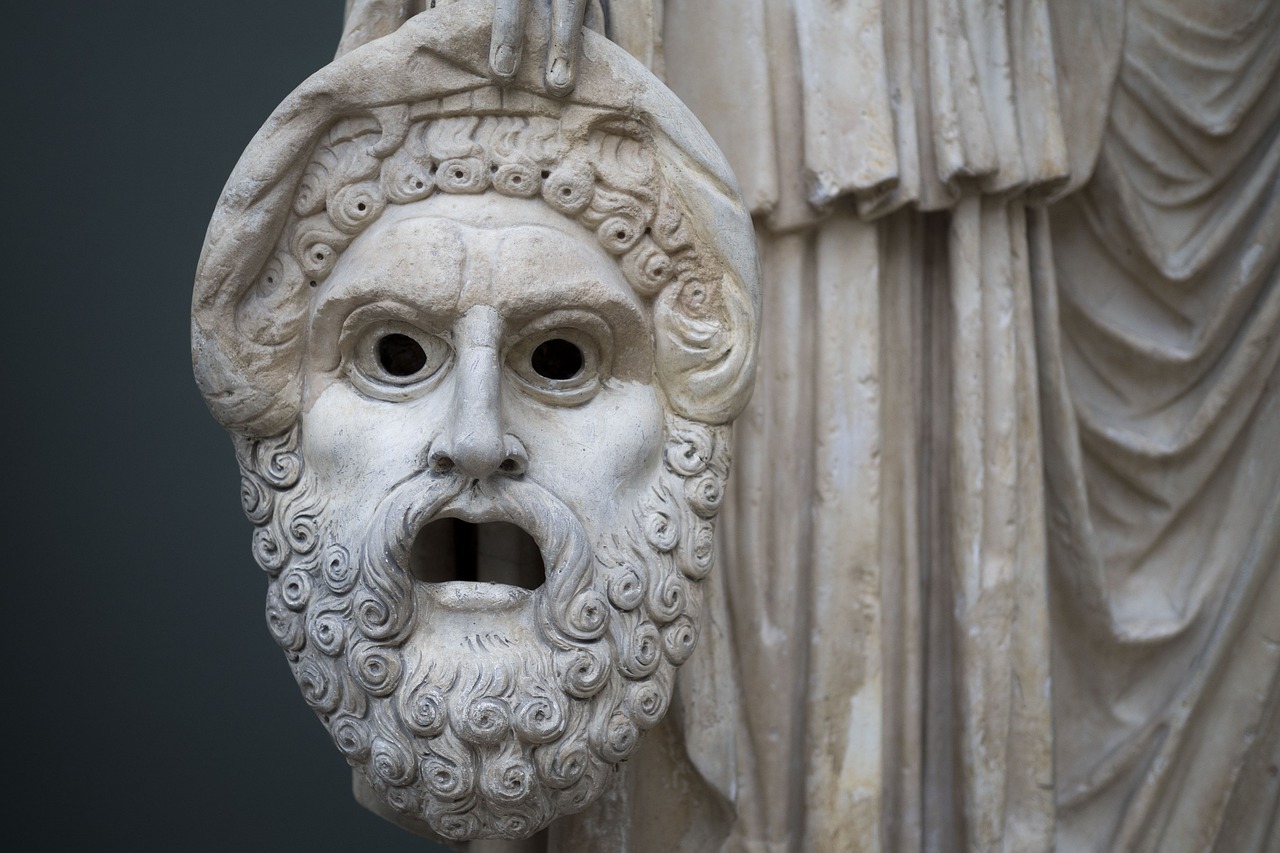The Influence of Ancient Religions on Modern Philosophies
Throughout history, the beliefs and practices of ancient religions have played a profound role in shaping modern philosophical ideologies. These ancient belief systems, such as Buddhism, Hinduism, and Taoism, laid the groundwork for many philosophical principles that continue to influence contemporary thought. By delving into the foundational principles of these religions, we can uncover the philosophical underpinnings that have stood the test of time and continue to impact our understanding of the world.

Foundational Principles
Exploring how the beliefs and practices of ancient religions have shaped and continue to impact contemporary philosophical thought and ideologies.
When delving into the foundational principles of ancient religions like Buddhism, Hinduism, and Taoism, one can uncover a rich tapestry of philosophical underpinnings that have stood the test of time. These belief systems are not merely sets of rules or rituals but encompass profound insights into the nature of existence, human consciousness, and the interconnectedness of all beings.
For example, Buddhism's emphasis on impermanence and the interconnectedness of all things challenges us to reevaluate our perceptions of reality and the self. Hinduism's concept of karma and dharma provides a moral compass for ethical living, while Taoism's focus on harmony with nature invites contemplation on the balance between action and inaction.
These foundational principles serve as the bedrock upon which ancient religions have built their philosophies, offering timeless wisdom that continues to resonate with seekers of truth and meaning in the modern world.

Transcendentalism and Eastern Thought
Transcendentalism, a philosophical movement that emerged in the 19th century, was heavily influenced by Eastern thought, particularly the teachings of ancient religions like Buddhism, Hinduism, and Taoism. The transcendentalist thinkers, including Ralph Waldo Emerson and Henry David Thoreau, were fascinated by the spiritual and philosophical ideas found in Eastern traditions. They sought to incorporate these concepts into their own philosophical framework, emphasizing individual intuition, the interconnectedness of all beings, and the importance of nature.
Emerson, known for his essay "Nature," encouraged individuals to connect with the divine through introspection and communion with the natural world. He believed that by tapping into their inner wisdom and embracing the beauty of the universe, people could achieve a higher state of consciousness and transcendental experience. Thoreau, on the other hand, put these ideas into practice by living simply in nature at Walden Pond, demonstrating self-reliance and a deep reverence for the environment.
The influence of Eastern thought on transcendentalism can be seen in the emphasis on self-discovery, spiritual exploration, and the rejection of materialism. Concepts such as the impermanence of life, the interconnectedness of all living beings, and the pursuit of inner peace were central to both Eastern philosophies and transcendentalist beliefs. By blending these ideas, transcendentalism offered a unique perspective on the relationship between the individual, society, and the natural world.

Moral and Ethical Frameworks
Exploring how the beliefs and practices of ancient religions have shaped and continue to impact contemporary philosophical thought and ideologies.
When delving into the realm of moral and ethical frameworks, one cannot ignore the profound influence ancient religions have had on shaping our understanding of right and wrong. The teachings of religions such as Buddhism, Hinduism, and Taoism have provided a strong foundation for ethical considerations in modern philosophical debates. These ancient belief systems offer intricate guidelines on how individuals should conduct themselves in society, emphasizing virtues such as compassion, honesty, and integrity.
Moreover, the concept of karma, prevalent in many ancient religions, has transcended time and continues to influence contemporary discussions on ethics. The idea that one's actions have consequences, whether in this life or the next, has sparked debates on the nature of morality and accountability. Ancient religious texts often serve as moral compasses, guiding individuals in navigating complex ethical dilemmas and shaping societal norms.
By examining the moral and ethical frameworks of ancient religions, modern philosophers gain insights into the diverse perspectives on what constitutes virtuous behavior and the implications of moral choices. These foundational principles not only offer guidance on personal conduct but also provoke critical reflections on the interconnectedness of individuals within a broader ethical framework.
Through the lens of ancient religious teachings, philosophers continue to explore the intricate balance between personal ethics and societal values, seeking to create a harmonious coexistence based on principles deeply rooted in the wisdom of the past.

Metaphysical Concepts
Metaphysical concepts play a significant role in both ancient religions and modern philosophical discussions. These concepts delve into the nature of reality, existence, and the fundamental principles that govern the universe. In ancient religions such as Hinduism and Buddhism, metaphysical ideas revolve around the concept of karma, reincarnation, and the interconnectedness of all beings. These beliefs have influenced contemporary philosophical debates on the nature of consciousness, the self, and the ultimate purpose of human existence.
One key metaphysical concept found in ancient religions is the idea of the eternal soul or spirit that transcends physical existence. This notion has sparked philosophical inquiries into the immortality of the soul, the relationship between mind and body, and the possibility of life after death. Philosophers throughout history have grappled with these metaphysical questions, drawing inspiration from the mystical traditions of ancient religious practices.
Moreover, the concept of dualism, which posits the existence of two fundamental substances or realities, has been a central theme in both ancient religious texts and modern philosophical discourse. Dualistic views on the mind-body relationship, the nature of good and evil, and the duality of existence have shaped philosophical inquiries into the nature of reality and the structure of the universe.
Ancient religions also explore the idea of interconnectedness and unity among all things, emphasizing the holistic nature of existence. This holistic perspective has influenced modern philosophical theories on interconnectedness, interdependence, and the unity of consciousness. Philosophers draw parallels between ancient religious teachings on unity and contemporary discussions on the interconnectedness of all aspects of life.
Overall, metaphysical concepts from ancient religions continue to inspire and inform modern philosophical thought, providing a rich tapestry of ideas and beliefs that challenge our understanding of the universe and our place within it.

Social and Political Implications
When delving into the realm of ancient religions and their influence on modern philosophies, one cannot overlook the profound social and political implications that have stemmed from these age-old belief systems. The teachings and practices of ancient religions such as Buddhism, Hinduism, and Taoism have not only shaped individual worldviews but have also left a lasting impact on societal structures and governance.
Throughout history, ancient religious beliefs have often been intertwined with political ideologies, influencing the establishment of laws, governance structures, and societal norms. The concept of dharma in Hinduism, for example, emphasizes the duty and moral responsibility of individuals within a societal framework, shaping the ethical principles that govern social interactions and political decisions.
Moreover, the hierarchical structures present in many ancient religions have had implications for political systems, with the idea of divine rulership or theocracy being prevalent in various historical contexts. These religious hierarchies often mirrored or directly influenced the power structures within societies, impacting the distribution of authority and resources.
At the same time, the emphasis on compassion, social justice, and community welfare in ancient religious teachings has inspired movements for social reform and activism throughout history. Figures such as Mahatma Gandhi, inspired by the principles of nonviolence and truth in Hinduism, led social and political movements that aimed to challenge oppressive systems and promote equality and justice.
Furthermore, the concept of karma, prevalent in many ancient religions, has implications for societal behavior and governance, suggesting a moral framework where actions have consequences and individuals are accountable for their deeds. This ethical underpinning has influenced modern debates on justice, accountability, and the role of individuals within a larger social context.
In the contemporary world, the intersection of ancient religious beliefs and modern political ideologies continues to shape discussions on human rights, environmental ethics, and global cooperation. The dialogue between spirituality and governance, ethics and policy, remains a vibrant area of exploration, highlighting the enduring impact of ancient religions on social and political thought.

Interfaith Dialogue
Interfaith dialogue is a crucial aspect of understanding the interconnectedness of different ancient religions and their impact on modern philosophical discourse. By engaging in conversations that bridge the gaps between diverse belief systems, individuals can gain a deeper appreciation for the similarities and differences that exist among various faith traditions. This dialogue fosters mutual respect, empathy, and a broader perspective on the rich tapestry of human spirituality.

Existentialism and Mythology
Existentialism, a philosophical movement rooted in the exploration of human existence and the individual's search for meaning, draws profound inspiration from ancient mythology. Mythological narratives, filled with archetypal characters and timeless themes, serve as a rich source of contemplation for existentialist thinkers. Just as heroes in myths confront trials and tribulations to discover their true essence, existentialism delves into the complexities of human existence, grappling with questions of purpose, freedom, and authenticity.
Ancient myths, whether Greek, Norse, or Mesopotamian, are replete with stories of individuals facing existential dilemmas, challenging the status quo, and seeking to define their place in the cosmos. These mythic quests mirror the existentialist journey towards self-realization and the confrontation of life's inherent uncertainties. The mythical figures of Prometheus, Odysseus, and Gilgamesh embody the existential themes of rebellion, journey, and mortality, resonating deeply with modern philosophical explorations of the human condition.
Existentialist philosophers like Jean-Paul Sartre and Albert Camus often drew parallels between mythological narratives and the existential predicament of modern individuals. The myth of Sisyphus, condemned to eternally roll a boulder uphill only for it to roll back down, encapsulates the absurdity and futility that existentialists grapple with in a seemingly indifferent universe. By engaging with mythological motifs, existentialism weaves a tapestry of existential angst, freedom, and the quest for authenticity, inviting individuals to confront the profound mysteries of existence.

Spirituality and Personal Development
Spirituality and personal development are intricately intertwined concepts that have gained significant attention in modern philosophical discourse. The journey of self-discovery and growth often involves exploring one's spiritual beliefs and practices to achieve a deeper understanding of oneself and the world. Ancient religions, with their rich traditions of meditation, mindfulness, and introspection, have provided a foundation for modern philosophical approaches to personal development.
Through practices like meditation, individuals seek to cultivate inner peace, clarity of mind, and a sense of connection to something greater than themselves. These spiritual practices not only promote mental well-being but also encourage personal growth and self-awareness. By delving into the depths of their consciousness, individuals can uncover hidden truths about themselves and their place in the universe.
Moreover, the integration of ancient religious teachings on compassion, empathy, and altruism into modern philosophical frameworks has emphasized the importance of ethical behavior in personal development. Concepts such as karma, dharma, and the golden rule have served as guiding principles for individuals seeking to lead a more meaningful and fulfilling life.
Furthermore, the exploration of spirituality in the context of personal development has led to a greater appreciation for the interconnectedness of all beings and the environment. By recognizing the inherent unity of existence, individuals can cultivate a sense of purpose and belonging that transcends individual desires and ego-driven pursuits.
In essence, spirituality and personal development go hand in hand, offering individuals a pathway to self-discovery, growth, and fulfillment. By drawing inspiration from ancient religious practices and philosophies, modern thinkers have developed holistic approaches to personal development that nurture the mind, body, and spirit.
Frequently Asked Questions
- What is the significance of ancient religions in modern philosophies?
Ancient religions have played a crucial role in shaping modern philosophical thought by providing foundational principles, moral and ethical frameworks, metaphysical concepts, and social and political implications that continue to influence contemporary ideologies.
- How have transcendentalist thinkers been influenced by Eastern religious philosophies?
Transcendentalist thinkers like Emerson and Thoreau were inspired by Eastern religious philosophies, integrating concepts of interconnectedness, nature, and spiritual transcendence into their philosophical works.
- What role do ancient religious teachings play in modern philosophical debates on morality?
Ancient religious teachings provide a rich source of moral and ethical guidance that informs contemporary philosophical discussions on right and wrong, contributing to the development of diverse ethical frameworks.
- How do ancient metaphysical ideas influence modern philosophical discussions on reality?
Ancient metaphysical concepts from religions such as Buddhism and Hinduism have influenced modern philosophical debates on reality and existence, shaping perspectives on consciousness, the self, and the nature of reality.
- What is the significance of interfaith dialogue in modern philosophical conversations?
Interfaith dialogue explores the intersections between different ancient religions, fostering discussions on diversity, pluralism, and the shared values that contribute to a more inclusive and interconnected philosophical landscape.



















